Redditor Intends To Give Her Sister’s Neglected And Abused Dog To A Friend, Seeks Advice Online
We all, as dog owners, can freely admit that we love our dogs. If we didn't, we wouldn't get out of a warm bed and take them outside for a walk in the early morning cold.
For many of us, claiming that dogs are "man's best friend" is an understatement. So, we can't say that our dog is family if we don't treat them as one.
That is exactly the point the OP in today's story was trying to convey. The OP and her sister have a complicated relationship, and her sister has a dog named Mochi, whom she helped them adopt.
Now, the OP's sister has left with her boyfriend, leaving her two daughters behind. The younger daughter moved in with the boyfriend, leaving the older sister with the dog.
The OP's niece goes out a lot and doesn't come back until the next day or the day after that. Mochi cries so loudly that it hurts, and the OP feels the dog is lonely and hungry.
The OP knows this because she lives next door with her husband and four cats. She tried her best to feed Mochi, but there was so much she couldn't do, as she couldn't afford to take in the dog.
So, the OP decided to rehome the dog, but her niece insists that Mochi is family. But is that how you treat family? Read the full story for yourself below.
The Headline...

I asked some friends, and this is how Mochi came into our lives
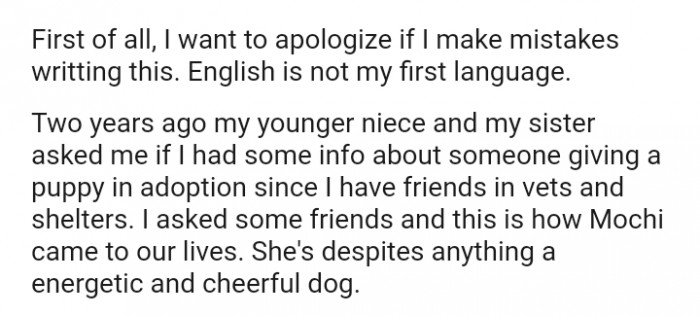
She leaves the door open, so she walks alone and unsupervised for an hour
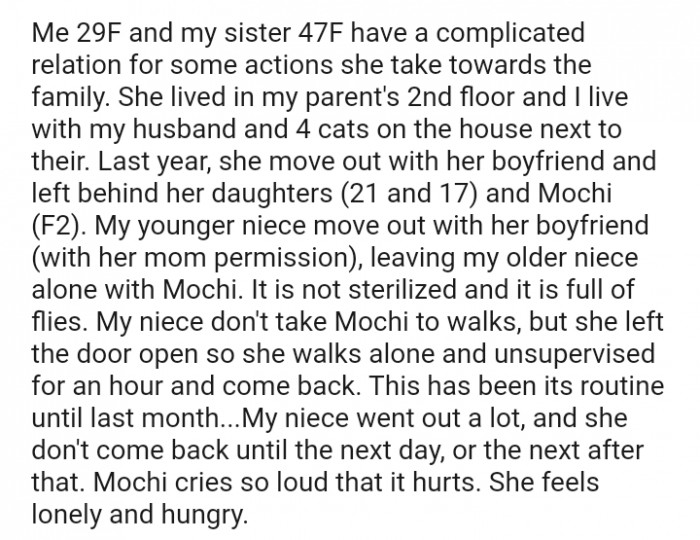
Understanding Pet Neglect and Abuse
Pet neglect and abuse often reflect underlying psychological distress in the owner rather than a straightforward lack of love or care. According to Dr. Ramani Durvasula, a clinical psychologist, "Many individuals who neglect pets are grappling with their own unresolved issues, which can lead to harmful behaviors towards animals." It's crucial to understand that these behaviors often stem from a cycle of learned helplessness, where the owner feels overwhelmed and unable to cope, leading to neglect of responsibilities. Dr. Durvasula emphasizes that "recognizing the emotional struggles of pet owners is essential in addressing the broader issue of animal neglect."
Understanding the Emotional Impact of Neglect and Abuse
Psychologists emphasize that neglect and abuse can have profound effects on both animals and humans. Research shows that animals experiencing neglect often exhibit behaviors that mirror trauma responses seen in humans, such as anxiety and aggression.
Dr. Emily Carter, a behavioral psychologist, explains that these experiences can lead to long-term emotional scars, which is why it's crucial to intervene when an animal is in a harmful situation.
The OP's mom gives the dog some chicken or meat, even cat food

The OP makes enough money to take care of them and the cats, but not enough for a dog

The OP doesn't want any more problems with her sister or her nieces

Moreover, the emotional bond between humans and pets can complicate these situations. A study published in the Journal of Animal Ethics found that individuals who have strong attachments to their pets often struggle with feelings of guilt and shame when they cannot provide adequate care.
This emotional turmoil can trap them in a vicious cycle of neglect, as they may feel unworthy of seeking help, further exacerbating the issue.
From a psychological perspective, the act of giving away a neglected pet can be interpreted as an attempt to break the cycle of trauma and create a healthier environment for both the animal and the owner.
According to studies in animal behavior, providing a stable and loving home is essential for rehabilitation, as it allows the animal to develop trust and reduce anxiety.
This transition can be emotionally challenging for the owner, who may feel guilt or sadness about the decision, but it's often a necessary step toward healing.
Here is what Redditors had to say about this story...
The OP should get the dog a real home

Get Mochi someone who can care for him

This dog is being neglected and needs help
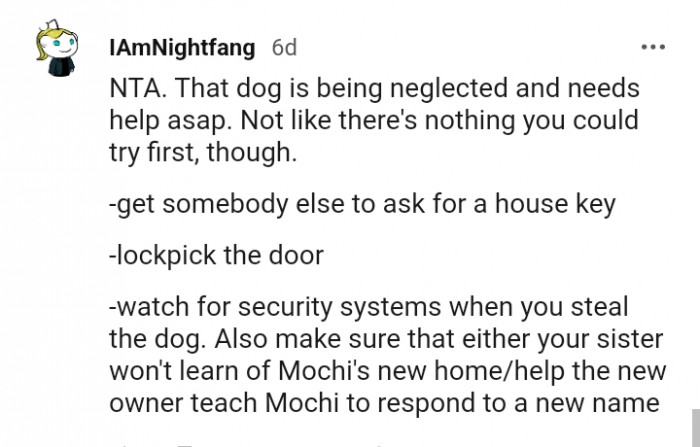
The Importance of Intervention and Support
When considering intervention for a pet in a neglectful situation, it's essential to approach the situation with empathy. Providing the owner with resources, such as local animal welfare organizations or mental health services, can be beneficial.
Research shows that offering support rather than judgment can lead to more positive outcomes, as it encourages the owner to seek help and make necessary changes.
The Bond Between Humans and Animals
The human-animal bond is a well-researched phenomenon, with studies indicating that pets can significantly impact their owners' mental health.
For instance, owning a pet has been linked to reduced levels of stress and increased feelings of companionship and love.
However, when that bond is marred by neglect or abuse, it can lead to complex feelings of attachment and guilt, complicating the decision to rehome the animal.
Avoid burning bridges or getting used

The OP's sister will tell her that it's not her dog
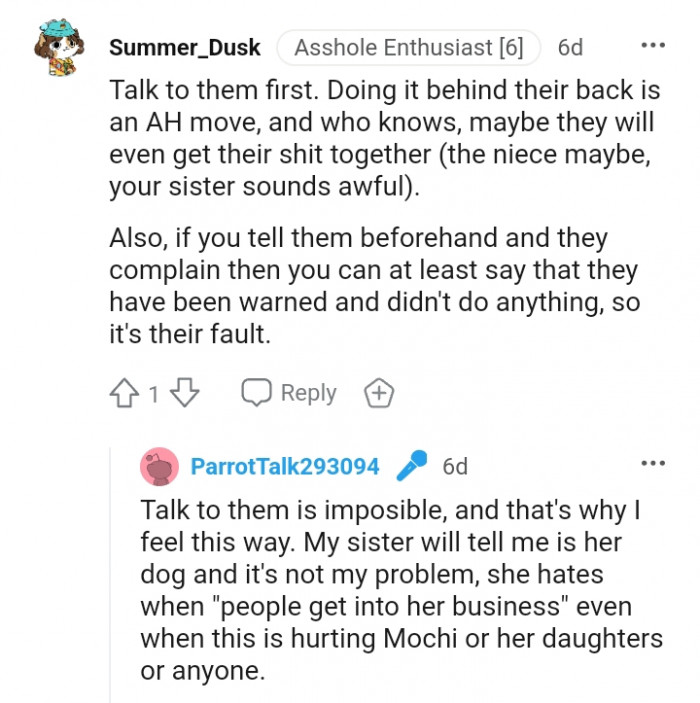
Either give the dog to someone or to the pound
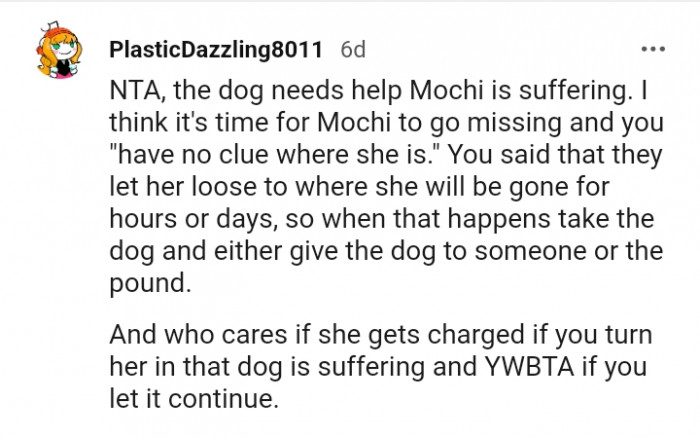
Additionally, it's important to recognize the role that social support plays in addressing these issues. Studies indicate that individuals who feel supported by their community are more likely to take steps toward improving their situations.
Encouraging friends and family to engage in supportive conversations can create a nurturing environment that fosters change and responsibility.
Behavioral specialists recommend assessing the emotional state of both the owner and the animal when considering rehoming.
Research in social psychology suggests that making decisions in a highly emotional state can lead to regret later on, so it’s crucial to approach the situation with a clear mind.
Taking time to reflect and potentially consulting with a veterinarian or animal behaviorist can provide valuable insights into the best course of action.
Give the dog to people who will care for him

The OP is looking for a way to take the dog out of there
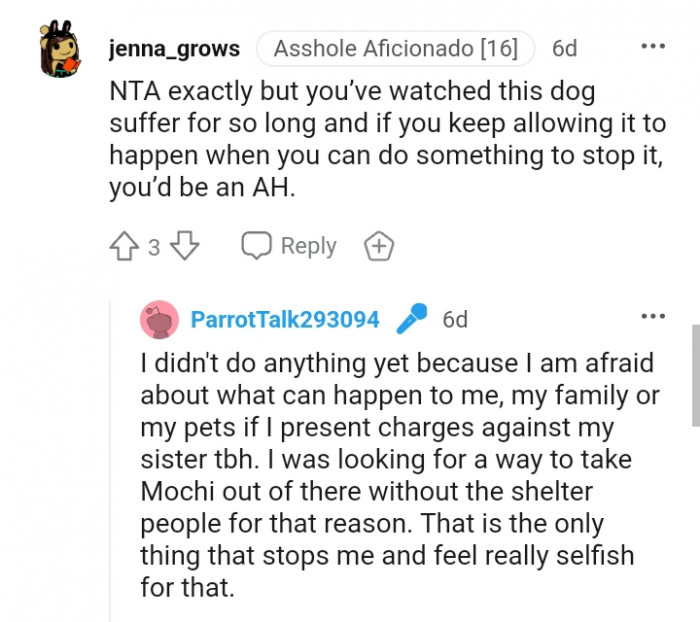
You can find the dog and take it somewhere else
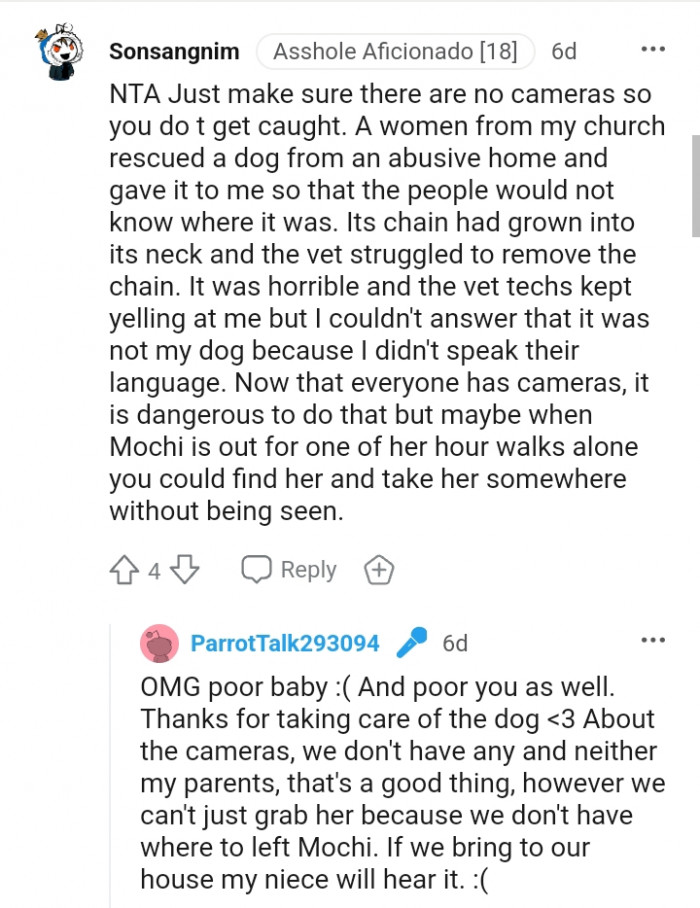
Practical Steps for Assisting Neglected Pets
For those witnessing pet neglect, one practical step is to document specific instances of neglect or abuse. This documentation can be crucial when reporting to authorities, as it provides concrete evidence of the situation.
Additionally, reaching out to local animal shelters or rescue organizations can offer both guidance and potential solutions for the neglected animal.
Creating a Safe Environment for Pets
For individuals considering rehoming a pet, it’s essential to think about the future well-being of the animal.
Consulting with local shelters or rescue organizations can provide options for finding a suitable new owner who understands the needs of abused animals.
Additionally, these organizations often offer resources for helping the current owner process their emotions and make the transition smoother.
You are not the legal owner of the dog

The poor dog is being abused and neglected
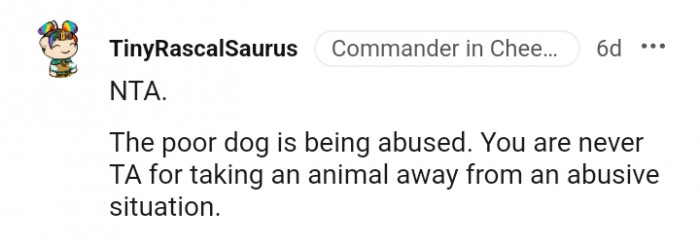
How can you not get to the dog to feed her?

Ultimately, fostering awareness about the mental health issues related to pet ownership can also play a significant role in prevention. Educational programs that include discussions on the responsibilities of pet ownership and the psychological implications of neglect can help create a more informed community.
Ultimately, the goal should be to ensure the animal's safety and happiness while also allowing the owner to heal from the emotional burden of neglect.
Research from the American Psychological Association suggests that providing support during this transition can lead to healthier outcomes for both parties involved.
Through careful consideration and proper resources, individuals can navigate this complex emotional landscape more effectively.
There are times when we take our pets home for dinner, knowing fully well that we left a wonderful restaurant even before dessert. We forgive our furry friends right away after they destroy our furniture or eat our favorite slippers.
These are things we do for our furry pals, but the OP's niece is clearly not doing her job. And yes, the dog should be rehomed.
The Importance of Seeking Support
Support systems are crucial when facing difficult decisions regarding pet care. Seeking advice from friends, family, or professionals can help clarify feelings and provide new perspectives.
In many cases, support groups exist for pet owners dealing with similar issues, allowing for shared experiences and collective healing.
According to research, social support can buffer against the emotional toll of rehoming a pet, leading to more positive outcomes over time.
Psychological Analysis
This situation highlights the complex emotional dynamics that arise when dealing with neglect and abuse. The decision to rehome a pet can stem from a place of compassion and the desire to create a better life for the animal. It's crucial to consider both the emotional well-being of the pet and the owner during this transition.
Analysis generated by AI
Analysis & Alternative Approaches
In conclusion, neglect and abuse in pets can deeply affect both animals and their owners, leading to complex emotional responses.
Understanding the psychological aspects of these situations can aid in making informed decisions about rehoming.
With the right support and resources, individuals can navigate this process while ensuring the well-being of their pets.
The Psychological Impact of Pet Ownership
Understanding the psychological benefits of responsible pet ownership is critical. Studies show that pets can provide significant emotional support, reducing symptoms of anxiety and depression in their owners.
By promoting responsible pet ownership, we can not only prevent neglect but also enhance the mental well-being of both pets and their owners.
Analysis & Alternative Approaches
In conclusion, addressing pet neglect requires a multifaceted approach that considers the psychological factors at play. By providing support and resources to pet owners, we can foster healthier relationships between humans and animals.
Ultimately, education and community involvement are essential in creating awareness and preventing neglect in the future.



